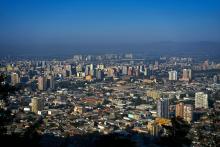The Paraguayan plan aims to compete with a rival Bolivian project to reuse existing gas pipelines and transport Argentine gas to Brazil. If any come to fruition, it would mark a major potential shift in regional energy flows.
Paraguay is advancing talks with energy companies and high-ranking government officials from Argentina and Brazil about a potential $1.5 billion gas pipeline to connect the three countries, it was revealed this week.
The plan drawn up by Paraguay aims to compete with a rival Bolivian project to reuse existing gas pipelines and transport Argentine gas to Brazil. If any come to fruition, it would mark a major potential shift in regional energy flows.
"We are in favor of signing a memorandum of understanding (for the gas pipeline) at the presidential level between the three countries" in June, said Mauricio Bejarano, Paraguay's vice minister of mines and energy. "In principle there is general sympathy for the project," he added.
As reduced gas production in Bolivia forces Brazil to look to other suppliers, the potential supply option to come from Argentina's burgeoning Vaca Muerta shale region across the Paraguayan Chaco is gaining ground, according to Rodrigo Maluff, vice minister of investments of Paraguay.
It would involve an estimated investment of between US$1.2 and US$1.5 billion, partly from the private sector, he added.
Officials and companies from Argentina and Brazil have also been in talks with Bolivia since last year about what they believe could be the fastest and cheapest option to transport gas from Vaca Muerta to the north of the region. This would involve reversing the flow of the pipeline from Bolivia.
In recent months, Paraguayan officials courted investors in Sao Paulo, met with Brazil's energy minister in Asunción and with Argentinean officials.
Tecpetrol, which controls about 15% of Argentina's shale gas production, was part of these latest talks, as was Pluspetrol, Maluff said. The companies did not respond to a request for comment.
Paraguayan officials said the pipeline's initial daily capacity is projected at 15 million cubic meters in the first stage.
Alexandre Silveira, Brazilian Minister of Mines and Energy who traveled to Asunción in April, said he was aware of Paraguay's intention and expressed support, but noted that more studies were needed. "We agreed to arrange another meeting with the private sector to better study the feasibility," he said.
Plans show that to reach Brazil the new gas pipeline would run 110 kilometers from Campos Durán, in northern Argentina, to the border with Paraguay, and then across another 530 kilometers of flat, arid land in the Paraguayan Chaco.
Another 400 kilometers of pipeline would connect Carmelo Peralta on the Paraguayan-Brazilian border to Matto Grosso do Sul and from there potentially join the existing Gasbol line to Sao Paulo, Brazil's largest city.
The governments of Bolivia and Argentina did not respond to requests for comment.
Bolivia has for years been a key supplier of gas to Brazil and Argentina, but its declining production and the potential growth of the Vaca Muerta shale region are about to change the dynamics of energy flow.
Silveira affirmed that the two proposals are not exclusive: The Paraguay option would help Brazil supply energy to its Tres Lagoas fertilizer plant in Mato Grosso do Sul, he added.
Brazil has made it clear that Argentine gas from Vaca Muerta - the world's second largest shale gas formation and fourth largest shale oil formation - will be needed to balance supplies due to Bolivia's declining gas production.
"Brazil represents the demand," said energy expert Victorio Oxilia, a professor at the National University of Asunción. "Without the Brazilian market it cannot be done, that is why the attitude that Brazil takes in relation to the project is fundamental."










